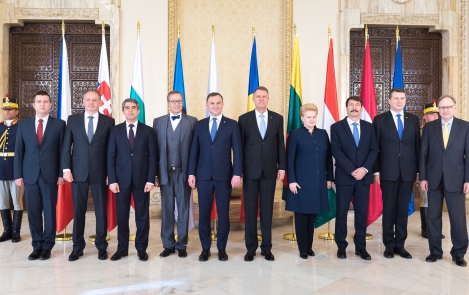The key words of the meeting of Central and Eastern European heads of state were allied solidarity and shared responsibility
 © Office of the President of Romania
© Office of the President of Romania Wednesday, 04 November 2015 15:21
Following the gathering in Bucharest of the presidents of nine NATO allies at the invitation of the Romanian and Polish heads of state, they emphasised "Allied solidarity and shared responsibility" in their joint declaration. NATO's reliance on solidarity and collective defence as well as secure Trans-Atlantic ties are important for the security of all of us, and these are based on common security space, a fair sharing of responsibility and solidarity.
The leaders of Bulgaria, Estonia, Lithuania, Latvia, Poland, Romania, Slovakia, the Czech Republic and Hungary met in Bucharest.
According to the Estonian Head of State, Toomas Hendrik Ilves, the annexation of Crimea and the aggressive behaviour of Russia in Ukraine, the actions of IS, incidents that take place in the context of Syrian and the migration crisis all test the unity of both the European Union and many of our neighbours, and this has resulted in the emergence of extremist and populist political parties in a number of states.
We need joint action, solidarity and a shared feeling of responsibility of the allies to cope with all of this – threats that approach from both the east and south, told President Ilves.
"We do not divide NATO into eastern and western allies as we wish to have a single and strong NATO that can deal with all the risks and challenges that are of concern for people in any region of the alliance," emphasised the Estonian Head of State.
He considered it important for the upcoming NATO Summit in Warsaw in July 2016 to give deterrence centre stage; this would include rotating units of the allies and pre-deployed weapons and supplies along the eastern wing of NATO, including joint exercises that match the current threats.
"Deterrence is our credible policy, and NATO needs to rely upon this to stand up for all its allies," said President Ilves.
He continues to support the "open door" approach to NATO as an opportunity to expand the stability and security zone as well as closer co-operation between NATO and the European Union to solve security problems that are of concern for Europe.
The meeting in Bucharest – a substantial discussion that occasionally resembled a brainstorming session – demonstrated that we all share a common understanding of the treats and problems that the region faces and we are united by decisiveness to face these challenges together, stated the Estonian Head of State who also acknowledged the presidents of Romania and Poland, Klaus Iohannis and Andrzej Duda, for initiating the meeting.
"We are also of the same opinion about the required steps, including raising defence expenditures to two per cent of GDP or at least as close to this level as possible," added President Ilves.
The previous NATO Summit in Wales was the first step taken by the alliance to face the changed security situation, while the Warsaw Summit should be an influential and credible next development step towards adopt some decisions of real importance to ensure the stability of the Trans-Atlantic common security space, told President Ilves.
Office of the President
Public Relations Department



